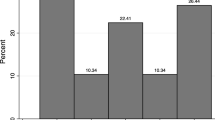Abstract.
I extend the standard materialistic rational choice model of conflict to consider groups. In particular, I consider how the aggregate amount of conflict in society depends on which groups form and oppose each other. The study is motivated by empirical findings about the relationship between inequality, conflict and economic development. I focus on a salient comparison: ethnic groups vs. social classes. I show that, contrary to the conventional wisdom, class conflict is not necessarily worse than ethnic conflict. In fact, ethnic conflict is general worse when the distribution of income is more equal. I also investigate the impact of the fact that while ethnicity is immutable, since there is social mobility, class is not. I show that the direct impact of mobility of conflict is as conventionally believed, but that there are important indirect effects which make the net effect ambiguous.
Similar content being viewed by others
Author information
Authors and Affiliations
Additional information
Received: June, 1998 / Accepted: November 22, 1999
Rights and permissions
About this article
Cite this article
Robinson, J. Social identity, inequality and conflict. Econ Gov 2, 85–99 (2001). https://doi.org/10.1007/PL00011021
Issue Date:
DOI: https://doi.org/10.1007/PL00011021




